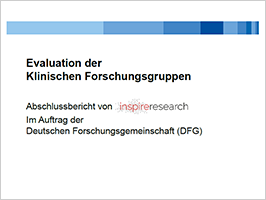Evaluation of Clinical Research Units
Final Report by inspire research commissioned by the DFG

Clinical Research Units (CRUs) aim to promote research collaborations in disease- or patient-oriented (translational) clinical research. For this purpose, scientific working groups and structures are established in clinical facilities on a long-term basis.
Since almost 15 years have passed since the programme reform in 2008, the DFG has now carried out a comprehensive evaluation of the CRU instrument with the support of the external agency inspire research in order to shed light on the extent to which this funding instrument has achieved its stated goals. The evaluation is based on an analysis of DFG proposal and funding data, an online survey of spokespersons and research coordinators of CRU establishment proposals for which decisions have been issued since 2008 and a comparison group of Research Unit spokespersons. In addition, qualitative interviews were conducted with managers and researchers at university medical institutions.
The results of the analyses show that the CRU instrument is highly successful in promoting outstanding coordinated research as well as contributing to profile-building and strengthening research priorities at university medical institutions, while some challenges emerge for the programme too, e.g. with regard to the research professorship, the fact that the CRUs are bound to a specific location, the temporary substitute positions and the resource requirements.
An Evaluation Commission representing different disciplines accompanied the entire evaluation process from the tender through to the preparation of the final report and, based on this, has issued a statement with recommendations that now provide an important basis for the further development of the Clinical Research Unit programme.
Further information
- To the Final Report "Evaluation of Clinical Research Units – Final Report by inspire research commissioned by the DFG [DOI: 10.5281/zenodo.7380273] (in German only(externer Link)
- To the Statement "DFG statement on the evaluation of clinical research groups (KFO)" [DOI:10.5281/zenodo.7398573] (in German only(externer Link)